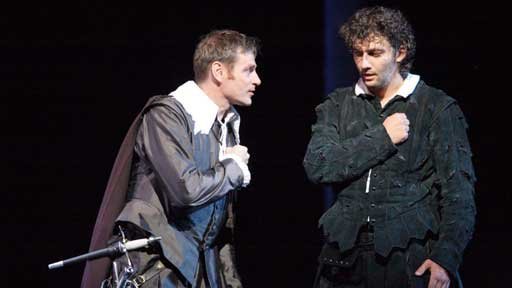|
|
|
|
|
|
|
|
| Musicomh, 16 September 2009 |
| Keith McDonnell |
|
|
Don Carlos
|
| Verdi's grand French opera, Don Carlos, is
his greatest achievement as it contains not only some of his finest music,
but great drama as well. |
|
 It
is unique in his operatic output as it deals with issues of church and
state, duty and honour and fidelity and friendship within an epic canvas. It
is unique in his operatic output as it deals with issues of church and
state, duty and honour and fidelity and friendship within an epic canvas.
The original version which Verdi intended to be performed never fails to
pack a theatrical punch yet is rarely performed these days.
Why opera companies, as the Royal Opera do here, choose to present this work
in an Italian translation has never ceased to baffle me as Don Carlos is a
French opera, and works best in its full Five Act version, in French. Since
Andrew Porter discovered much 'missing' music in Paris in the 70s, it has
been possible to piece together the opera as Verdi intended and the Royal
Opera came close to a full version in 1996 in the memorable Luc Bondy
staging, conducted by Bernard Haitink. It wasn't as full a version as the
ENO presented in the early 90s in a brilliant Poutney/Lazaridis staging
(alas never revived) but that, like this Royal Opera performance, was
performed in translation (albeit in English).
As Jonas Kaufmann (the Royal Opera's Don Carlos) said in his interview
with us: "Of course it was written in French and it fits perfectly in
French. In Italian you can see that it's sort of made to fit. It's pasted on
at times." Respected opera guru Rodney Milnes has often stated that Verdi
didn't set a single word of the Italian translation to music, and it shows.
So why not perform it in the original French?
It seemed an especially missed opportunity as Jonas Kaufmann sings
faultlessly idiomatic French but he is at equally at home in Italian as he
showed here with his wonderful singing in the title role. A vast improvement
on his predecessor, not only is he capable of exquisite mezza voce singing
but he has enough vocal reserves to ride the ensembles when required. He's
untouchable in this repertoire at the moment and his singing was a joy from
start to finish, although the baritonal quality to his voice may not be to
everyone's taste. In the duets with Posa it was at times hard to distinguish
his voice from Simon Keenlyside's, but that's a small price to pay for the
pleasure in hearing such a thrilling voice.
Keenlyside was reliable as Posa, but his voice lacked the required heft at
times and he was often dramatically blank, but he wasn't alone there.
Furlanetto was an imposing presence as Philip II but dramatic sparks only
began to fly in his scene with John Tomlinson's oleaginous Grand Inquisitor.
Marina Poplavskaya was far more vocally resplendent as Elisabeth this time
round, yet she still doesn't know how to float enough pianissimo top notes
which would give her interpretation true regal bearing. Marianne Cornetti
needed more light and shade as Eboli, and a little less thunder, whilst all
the smaller roles were adequately filled.
So why did this performance fail to move? Despite the fact Nicholas Hytner
was on hand to direct this first revival it was hard to fathom exactly what
direction he had given the singers – which is strange as he has
theatricality coursing through his veins. Of course Bob Crowley's garish,
hideous designs don't help, but for most of the evening the cast seemed
dramatically at sea so the drama, tension and epoch-making issues that Verdi
has laid bare in this opera failed to cross the footlights. Semyon Bychkov's
over indulgent conducting didn't help either as it was at times too sluggish
or too fast, but the orchestra played like heroes. |
|
|
|
|
|
|
|
|
|
|
|
|
|
|
|
|
|
|